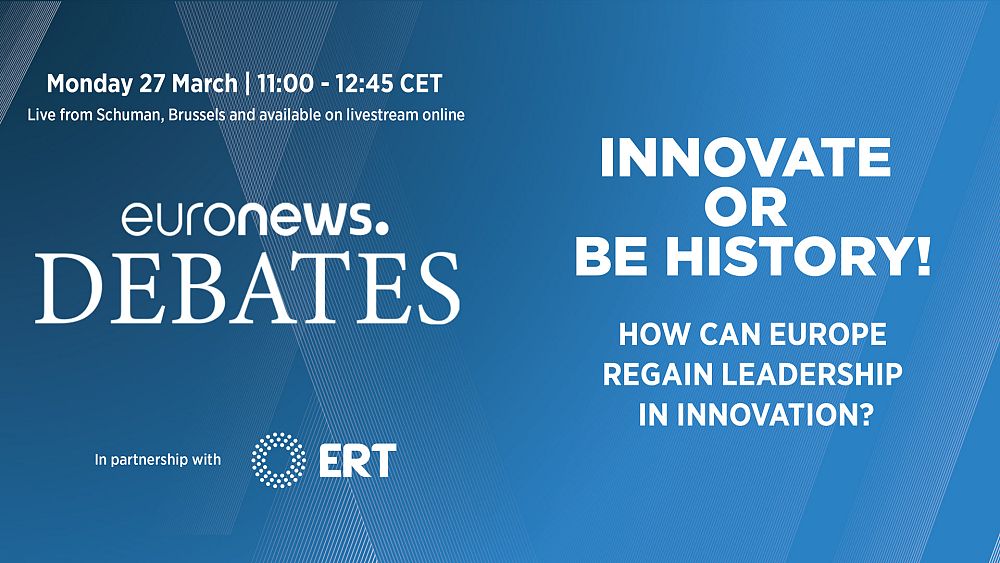
Innovation is seen as key to solving some of Europe’s biggest societal, environmental and economic challenges. But competitiveness is lagging and renewed geopolitical uncertainty and Russia’s war in Ukraine are adding additional pressures.
How can Europe elevate its innovation ambitions to the next level and retake pole position on the international stage?
Join us for our latest Euronews Debate, Innovate or be history! How can Europe regain leadership in innovation? from 11am (CET) on Monday 27 March. Organised in partnership with the European Round Table for Industry (ERT), the debate is part of a physical event in Brussels, which will be broadcast live on YouTube.
Our panel of experts will discuss everything from funding to regulation and education to entrepreneurship, putting forward their perspectives on building Europe’s future path to innovation success.
Ahead of the debate, Frank Heemskerk, ERT Secretary-General, will make an opening address. This will be followed by a keynote speech from Signe Ratso, Deputy Director-General of the European Commission’s Research and Innovation Directorate-General (RTD) and an address from Dr. Martin Brudermüller, CEO, BASF and Chair of the ERT Committee on Competitiveness and Innovation.
The panel will include:
Eva Maydell, MEP and Member of the ITRE Parliamentary Committee

MEP Eva Maydell (Group of the European People’s Party) is a Member of the European Parliament’s Committee on Industry, Research and Energy. Her policy priorities feature innovation and the use of new technologies as well as supporting entrepreneurs and sustainable investments in Europe. Maydell is the lead rapporteur in the Industry Committee on the AI Act, the first-ever general law on Artificial Intelligence as well as the EPP Group rapporteur on the NIS 2 Directive on cybersecurity. In addition, Maydell is a Board Member for World Economic Forum’s Digital Europe program and a member of the WEF Global Future Council of Europe.
Dr. Martin Brudermüller, CEO, BASF

Dr. Brudermüller is Chairman of the Board of Executive Directors of BASF SE, a role he has held since 2018. In 2019, he became Chair of ERT’s Committee on Competitiveness & Innovation. In addition, Brudermüller is currently the President of the European Chemical Industry Council (CEFIC) and the International Council of Chemical Associations (ICCA). In 2021, he was also appointed to the Supervisory Board of Mercedes-Benz Group AG and is a Member of the Presidium of the German Business Association BDI and the Alliance to End Plastic Waste (AEPW).
Ann Mettler, Vice President, Europe, Breakthrough Energy

At Breakthrough Energy, Ann is working with European partners to accelerate clean tech innovation in the pursuit of climate neutrality and net-zero emissions. Previously, she served as Director-General at the European Commission where she ran the internal strategy department, reporting directly to the President. In this capacity, Ann also served as Chair of the European Strategy and Policy Analysis System (ESPAS). An entrepreneur at heart, Ann set up her own think tank which she ran for more than a decade. Her career started at the World Economic Forum where she led the Europe department.
Prof. Dr. Ignacio Cirac, Director, Max Planck Institute of Quantum Optics

Ignacio Cirac is a Spanish physicist, Director of the Max Planck Institute of Quantum Optics in Germany and a Board Member of Telefonica S.A. He is an expert in quantum computing and communication. Cirac is the Director of the International Max-Planck Research School on Quantum Science and Technology, co-speaker of the Munich Center for Quantum Science and Technology, and coordinates the consortium on theoretical quantum computing in the Munich Quantum Valley.
Dr. Lars Frolund, Deep Tech Lecturer, MIT (Massachusetts Institute of Technology) and Board Member, European Innovation Council

Dr. Lars Frolund is a Deep Tech Investment expert and executive. His expertise lies at the intersection of mission-driven innovation (including defence and security), grant & venture capital investments into deep tech ventures, and the geopolitical/strategic aspects of technological capacity building in innovation ecosystems at national and international levels. Frolund is currently a Lecturer at the Massachusetts Institute of Technology (MIT). He also serves on the Board of Directors of the European Innovation Council, the EIC Fund Board and the Danish Innovation Fund.
Méabh Mc Mahon, Euronews, Moderator
Register for the event by filling the form below:
Registration Form
How does Europe’s innovation scene look right now?
Europe has a dynamic and diverse ecosystem when it comes to research and development and innovation.
A mix of public and private organisations, universities, businesses and entrepreneurs are driving development across a range of sectors, including things like healthcare, artificial intelligence, robotics, biotech and renewable energy.
There is also a vibrant start-up scene, with cities like London, Berlin, Paris and Stockholm emerging as hubs for spawning new companies.
But Europe’s innovation scene faces some big challenges at a time when it is seen as crucial to solving some of the biggest and most pressing issues. Things like climate change and energy security.
European competitiveness has been on a downslide for “quite a while,” according to the European Round Table for Industry (ERT), a forum bringing together Chief Executives and Chairs of major multinational companies of European parentage, covering a range of industrial and technological sectors.
It highlights that additional pressures are now arising from the renewed geopolitical uncertainty, the energy market implications of Russia’s war in Ukraine and the attraction of business to America because of the US Inflation Reduction Act.
These pressures come alongside growing concerns about a ‘brain drain’ of highly skilled researchers leaving Europe to work in other countries. There is also a gender gap to be closed in research and development, tech and leadership.
In 2021, less than 1 in 5 of Europe’s ICT specialists (19.1%) were female, according to Eurostat data.
Women are also woefully underrepresented in decision-making roles related to climate change and the environment, says the European Institute for Gender Equality. In EU member state governments, it highlights, only 27% of ministers responsible for policies in these fields are female.
What is Europe doing to drive up innovation and its leadership role?
The EU says innovation, particularly deep-tech innovation (solutions for society’s biggest challenges), is at the heart of its response to bring down greenhouse gas emissions, to make Europe’s economies more digital and to guarantee the future security of food, energy and raw materials.
It points to the New European Innovation Agenda, adopted last year, as positioning Europe at the forefront of developing new technologies and bringing them to the market.
The strategy aims to boost access to finance for start-ups and scale-ups; to create conditions for innovators to experiment; and to drive-up recruitment and retention, through training one million deep-tech talents and hiking support for female innovators.
The EU has also been working to strengthen the research and development and innovation landscape through other projects like the European Research Area, which aims to create a
single, borderless market for research, innovation and technology across the bloc.
Also, Horizon Europe, a €95.5 billion research and innovation funding programme, running from 2021 to 2027.
What should be the key focus areas going forward?
Despite the challenges, Europe remains a vibrant hub for research and development and innovation. But there is plenty of potential for further growth and development. Something that requires a concerted, joined-up approach, involving both the public and private sectors.
As our Euronews Debates panel maps out Europe’s future path to innovation success, the experts will discuss:
• Funding: increasing and improving access to grants and other financial sources to facilitate and promote innovation
• Collaboration: creating networks that generate influential research and connect researchers with businesses
• Entrepreneurship: funding, mentoring and training programmes to develop and commercialise new ideas
• Education: the role of governments in providing funding for university research, creating STEM programmes and offering scholarships
• Open innovation: encouraging companies to collaborate with external partners through platforms such as open data initiatives and hackathons
• International collaboration: providing funding and support for European countries to collaborate internationally to lead new innovations
• Regulations: breaking down barriers through simplifying rules and regulations, how to make it easier for businesses to develop and commercialise new products and services



